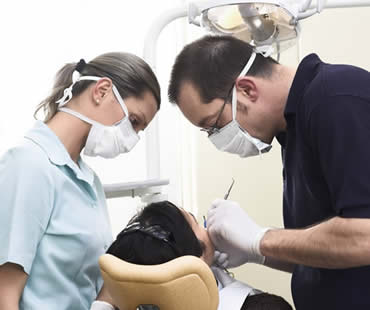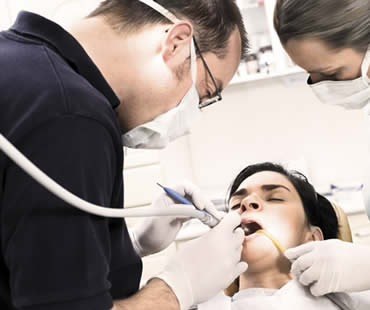
Fear can stop come people from doing certain activities, and sometimes it may impact a person’s health and overall wellbeing. One example is visiting the dentist. You might be surprised at the number of people who completely avoid dental care because they are afraid. As a result, sedation dentistry has become a popular way to allow nervous patients to get the necessary treatment without all of the negative vibes.
Sedation dentistry involves administering drugs to help patients relax. There are various levels of sedation available, depending on the patient’s needs, procedures, age, and medical history. Your dentist can help decide which sedation amount and method is most appropriate for you. It ranges from light sedation to simply take the edge off, moderate sedation that renders you unaware but still awake, or deep sedation that practically puts you to sleep throughout treatment.
There are also a variety of methods for sedation dentistry. Oral medications are swallowed, nitrous oxide gas is administered through a mask over your nose, or medications can be given through an intravenous needle directly into your veins. The method is recommended based on each patient’s needs and situation.
Dental sedation manages pain so that you won’t feel anything during treatment. Most patients do not remember much about what occurred while under sedation. That is especially beneficial for patients with dental fears, because they are more willing to return for future appointments since they don’t have any bad memories from the last one.
Sedation is safe and effective when performed by a trained dentist. Make sure that any dentist who administers your dental sedation is qualified and experienced with the techniques. There is no reason to avoid dental checkups and treatment due to fear or anxiety. It is much better to get care to correct problems before they worsen, or head them off before they start. Sedation dentistry enables patients to comfortably and safely obtain treatment and eliminate dental fears.
If you need a dentist in Toronto contact us today

Once you and your dental professional have agreed on conscious dental sedation for use during your dental treatment, there are a variety of ways in which it can be administered.
Inhalation sedation or the use of nitrous oxide (laughing gas) is a light form of conscious sedation. Your sedation dentist will administer a combination of nitrous oxide and oxygen through a mask that is placed over your nose. During the procedure, you inhale the gas through your nose and back out through your mouth. Nitrous oxide wears off almost immediately upon completion of the procedure with minimal to no recovery time or side effects.
Oral medication used for sedation purposes produces medium or moderate sedation effects, depending on the strength of the prescription administered by your sedation dentist. Oral sedation usually comes in pill form and is taken approximately one hour prior to the procedure. You may feel sleepy, but should still be able to respond to your dentist’s commands. Recovery time is longer with oral sedation, and requires someone to drive you home. Side effects are rare, but may include nausea or vomiting.
Another moderate form of conscious sedation is intravenous (IV) sedation. In the case of IV sedation, the drugs are administered directly into your veins through a needle. The effects of IV sedation are much quicker than oral sedation. IV sedation allows your dental professional to adjust the levels of sedation during treatment. With IV sedation, you may begin to feel alert soon after the medication has stopped; however, you should not drive or operate heavy machinery for at least 24 hours after the procedure.
Conscious sedation should only be performed by a dental professional with appropriate training. Your sedation dentist will consider your health history when choosing the appropriate form of sedation to best suit your needs. While conscious sedation is considered safe, it is best to work with a qualified sedation dentist to determine the best form of administration for your dental treatment.
We look forward to seeing you in our Toronto dental office

Sedation dentistry is rapidly becoming an extremely popular choice for patients, offering them the best oral care available while providing them with a comfortable, stress-free experience. Benefits exist for both the patient and the dentist, especially for certain patient groups, who may only be able to obtain dental care they need while under some kind of sedation.
Sedation dentistry uses various medications to help the patient relax while undergoing a dental procedure. The sedation allows the patient to be free of fear, anxiety and stress, and in some cases, to have a reduced memory of the treatment itself. This allows for a much more favorable experience, especially when undergoing invasive, extensive or multiple-visit treatments such as extractions, gum surgery, root canals, or some dentistry procedures.
Because sedation dentistry is specifically designed to reduce or to alleviate fear and anxiety, the patient is more relaxed during the dental visit. Dentists working on tense or anxious patients are often aware of the problem and have to work with greater care. The removal of this patient tension allows the dentist to work more quickly and surely, leading to a shorter appointment and a more positive experience for both doctor and patient.
Dentists require cooperation from the patient in order to proceed with any dental procedure. Patients who are very young, have special needs, an acute gag reflex, or movement control issues can be extremely challenging for dentists to administer the necessary care. Sedation dentistry can solve this problem, allowing for patients to be cooperative and still, providing the safest, best experience for patient and doctor alike.
Patients who have positive experiences at the dentist are more likely to return for regular dental check-ups. These patients have overall better dental hygiene and tend to have fewer serious dental issues over time. Patients who have good oral care will feel better about their smiles and will be more confident and comfortable throughout the day.
Schedule your appointment at our Toronto dental office

Sedation dentistry at our Toronto dental office helps patients get the care they need for their teeth and can turn an otherwise stressful experience into a comfortable dental visit. Initially developed to focus on patients with special needs and those with acute dental phobias, it has progressed to be utilized by a wide range of patient groups.
Putting off dental care can affect all levels of your health. Even regular cleanings are shown to improve overall health. Untreated issues can lead to bad breath, gingivitis or periodontitis, bone loss, acute gum disease, or other serious issues.
Have you put off your dental care? Have you have been wondering if a faster, more comfortable and relaxed dental experience could benefit you? If so, see if some of the symptoms below are relatable to you.
- You miss regular check-ups and postpone care.
- You experience anxiety at the mere thought of a dental visit.
- It has been years since your last dental examination.
- The sights, sounds, and smells of a dental office cause you to feel uncomfortable and tense.
- You feel exhausted after a dental visit. Your muscles are tired and sore.
- You have an acute gag reflex and worry about vomiting during a dental procedure.
- You have difficulty getting numb during procedures.
- You have a physical condition such as Parkinson’s disease or cerebral palsy that causes you to make involuntary movements.
- You have TMJ (Temporomandibular Joint disorder) or are unable to keep your mouth open for long periods of time.
- Your jaw might be sore for days after a dental visit.
- You need extensive, painful or treatments over several visits, such as gum surgery, bone grafting or extractions.
- You have a fearful and anxious child who won’t follow instructions or sit still during a dental visit.
- You desire the most comfortable dental experience possible.
Does even one of these descriptions ring true for you? If so, talk to your dentist about sedation dentistry today! Don’t wait to enjoy the optimal level of oral care available to you.
Schedule your appointment at our Toronto dental office

Many people suffer from dental fear and anxiety to the point that they avoid even routine dental checkups and cleanings. Unfortunately, ignoring your oral healthcare can have dire consequences, affecting not only your dental health but your overall general health as well. If you are nervous and fearful of dental visits, you may be interested to learn about the benefits of sedation dentistry.
Sedation dentistry is a safe and commonly utilized option for dental patients to help them relax and undergo dental procedures without fear or apprehension. Your sedation dentist can offer a variety of sedation choices, and will likely suggest the option they feel best suits your needs.
Conscious sedation allows you to remain fully awake and able to respond to commands while enjoying a comfortable and relaxed state. Some of the options for conscious sedation include:
- Nitrous oxide, or “laughing gas”, leaves you feeling relaxed but responsive during dental procedures.
- Oral sedatives can be taken about an hour before dental treatment and provide their calming effects before and during your dental appointment.
Dental sedation allows you to undergo procedures as routine as a regular cleaning to more involved treatments like root canal therapy without anxiety and fear. You will remain awake but relaxed, and have little or no memory of your procedure. Consult with Toronto dentist Dr. Cruz to find out more about how sedation dentistry can ease your fear of the dental chair and allow you to get the dental care you need.
If you live in the Toronto area contact us today

If you avoid getting dental care because of the anxiety and fear of going to the dentist, you are not alone. It is estimated that forty million Americans don’t seek regular dental care because they are uncomfortable or afraid of going. Sedation dentistry has been developed to manage the pain and anxiety of dental visits, while still providing patients with the ability to respond to verbal commands and physical stimulation.
Here are some guidelines to help you determine if sedation dentistry might help you:
• You are fearful about dental instruments and procedures.
• Local anesthetics have not had a numbing effect on you in the past.
• Your gag reflex is overly sensitive.
• You have a fear of shots or needles.
• The noises, tastes, and odors associated with dentistry bother you a great deal.
• You have extremely sensitive teeth.
• Your dental problems are complicated, or you need to have several procedures in a single visit.
• You have experienced traumatic dental experiences in the past.
• Health issues such as neck or back pain or TMJ make it uncomfortable for you to sit in the dentist’s chair or open your mouth for extended periods.
Putting off dental care is not recommended because it can result in more serious problems or invasive procedures later. If some of the characteristics above describe you, consult your dentist about ways to help you relax and become more comfortable with checkups. Sedation dentistry techniques like oral, or inhaled sedation may be just what you need to allow you to confidently seek dental care on a regular basis.
If you live in the Toronto area contact us today







 E-Mail Us
E-Mail Us  416-595-5490
416-595-5490








